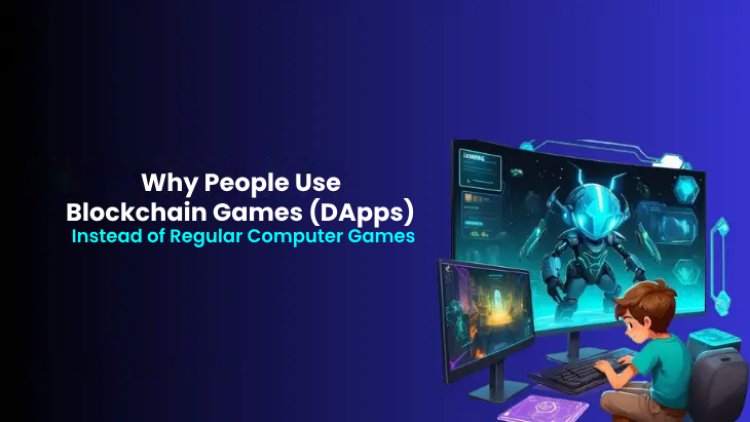Why People Use Blockchain Games (DApps) Instead of Regular Computer Games
Let’s explore the benefits of using DApp games and why they are rapidly growing in appeal.
Share this Post to earn Money ( Upto ₹100 per 1000 Views )

In recent years, blockchain technology has made its way into numerous industries, including gaming. Blockchain-based decentralized applications (DApps) have emerged as a popular alternative to traditional computer games, providing a unique combination of transparency, security, and player empowerment. But why are more gamers choosing blockchain games over conventional ones?
Let’s explore the benefits of using DApp games and why they are rapidly growing in appeal.
1. True Ownership of In-Game Assets
One key reason players opt for blockchain games is the concept of true ownership. In regular computer games, players spend hours earning rewards or purchasing assets, but these assets are ultimately controlled by the game developers. Players lose their hard-earned items if the server shuts down or the game is no longer supported.
In contrast, blockchain DApps utilize NFTs (non-fungible tokens) and smart contracts, allowing players to truly own their in-game assets. These assets are stored on the blockchain, meaning players have full control over them, independent of the game developers. Whether it's rare skins, powerful weapons, or unique characters, these items can be traded or sold in secondary markets, giving players real financial value for their time and effort.
2. Play-to-Earn Models
Blockchain DApp games have introduced a new paradigm in gaming: the play-to-earn model. Unlike traditional games where players invest money with no financial returns, DApp games enable players to earn cryptocurrency by completing tasks, achieving milestones, or trading in-game assets.
The play-to-earn concept has allowed many players, especially in developing countries, to supplement their income while enjoying their favorite games. It has also attracted a new wave of gamers who see these games as fun and financially rewarding.
3. Transparency and Fairness
Regular computer games often face criticism for their lack of transparency, especially when it comes to rewards, loot boxes, and game mechanics. In contrast, blockchain DApp games operate on decentralized, public ledgers, ensuring transparency in every transaction. Players can easily verify the fairness of game mechanics, knowing the rules cannot be altered or manipulated without consensus.
For competitive gamers, this trust in fairness is a significant draw, as it levels the playing field and eliminates concerns over biased outcomes or manipulated results.
4. Interoperability of Assets
A major reason players choose blockchain games is the idea of true ownership. In traditional computer games, players invest time in earning rewards or buying assets, but these are ultimately controlled by the game developers. If the server goes offline or the game is discontinued, players lose access to their valuable items.
This flexibility adds an extra layer of value to the assets players own, enhancing the gaming experience by providing a richer ecosystem where assets transcend individual games.
5. Community Ownership and Governance
One of the unique aspects of blockchain games is the involvement of players in decision-making processes. Many DApp games operate using decentralized autonomous organizations (DAOs), allowing players to vote on the future direction of the game, such as new features, updates, or even changes to the game economy.
This community governance model empowers players, giving them a say in the development and evolution of the game, a sharp contrast to the top-down management seen in regular computer games. For players who feel deeply connected to the games they play, this sense of ownership and involvement is a massive benefit.
6. Security and Decentralization
Traditional games often rely on centralized servers, making them vulnerable to hacks, cheating, or even data loss. Blockchain DApp games, on the other hand, operate on decentralized networks, reducing the risk of such vulnerabilities. By leveraging blockchain’s cryptographic security features, DApp games provide a safer, more robust gaming environment for players.
With decentralized servers, players also enjoy more control and assurance that their game progress, assets, and data are secure, even if the game developer ceases to support the game.
Conclusion: A New Era of Gaming
Blockchain DApp games are ushering in a new era of gaming, offering players unprecedented levels of control, financial rewards, and involvement. By combining cutting-edge blockchain technology with engaging gameplay, DApp games are transforming the way players interact with games, moving beyond entertainment to a realm where gaming and economy intersect.
If you are looking to enter the world of blockchain gaming or develop your own DApp game, partnering with an experienced Blockchain DApp Game Development Company is essential. Whether you want to build a play-to-earn model, design interoperable assets, or create a secure, decentralized gaming ecosystem, expert developers can help you turn your vision into reality.
The future of gaming is moving towards decentralization, with blockchain DApp games at the forefront of this shift.














